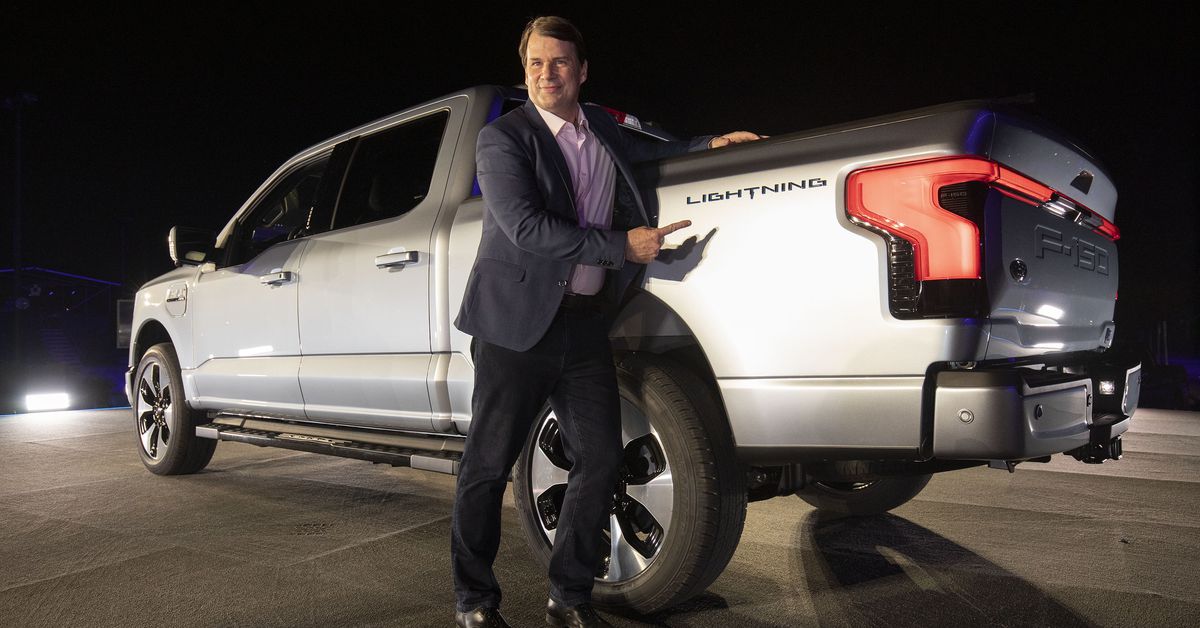
The race to cram heavier and heavier batteries into bigger and bigger electric vehicles hit a speed bump today when a major automaker CEO finally threw up his hands and asked why.
“I have no idea what’s going on in this industry right now,” Ford CEO Jim Farley said during his company’s capital markets event Monday. He referenced electric vehicles coming out with 450–500 miles of range, including “a three-row crossover” announced today that was likely the new electric Cadillac Escalade.
Higher ranges will necessitate bigger batteries, he noted, adding, “These batteries are huge.”
“These batteries are huge.”
Farley is right. US automakers are relying on supersized batteries to power their equally supersized EVs — namely, all the electric trucks that will soon flood the US market. Car companies (perhaps rightly) assumed that the best way to sell America’s truck-loving population on plug-in power is to electrify a bunch of pickups. And big trucks need big batteries to justify big range to address anxiety any truck buyers may have about switching sides to electric.
The Rivian R1T truck and R1S SUV run on batteries as large as 135kWh. The Hummer EV’s 212kWh battery is heavier than a Honda Civic. Chevy just announced a higher range estimate for its forthcoming Silverado EV for a total of 450 miles on a single charge. That’s thanks to the 200kWh Ultium battery firing its electrons beneath the floorboards of this 8,000-pound behemoth. The Ram 1500 REV includes an option for a 229kWh battery for a targeted range of 500 miles.
This is not sustainable. Bigger batteries, longer range, heavier trucks… these are not the hallmarks of the sea change the auto industry is trying to sell us on. Its evidence in support of the old adage, “the more things change, the more they stay the same.” We’re swapping bad stuff, like tailpipe emissions, for other bad stuff, like everything involved in the mining, refining, and manufacturing of an EV battery.
Bigger batteries, longer range, heavier trucks… these are not the hallmarks of the sea change the auto industry is trying to sell us on
There are also a host of environmental concerns around these beefcake batteries. EVs are generally heavier than their internal combustion engine counterparts. But what many people seem to forget is that heavier vehicles are inherently more polluting than lighter ones, regardless of whether they emit any tailpipe emissions. All vehicles produce non-exhaust emissions from a variety of sources, including rubber tires, road dust, and brakes. This is especially true for electric vehicles thanks to the added weight from their batteries.
Heavier vehicles are deadlier, too. When a pedestrian or cyclist is struck by a vehicle the size and weight of a Ram 1500 REV or Hummer EV, they are more likely to die than when they are struck by a Toyota Corolla. A lot of that has to do with the outsize dimensions of these trucks — boxier front ends and taller hoods are more likely to strike someone in the head or upper torso than a sedan, which is more likely to hit a person in their legs.
But weight has a lot to do with it, too. Last I checked, mass multiplied by velocity equals momentum. Basic physics. The heavier the vehicle, the more likely it is to kill you when it hits you.
To be sure, Farley’s beef with battery sizes isn’t really about safety or the environment but, rather, about cost. Heavier batteries are more expensive to manufacture and tend to squeeze profit margins, of which automakers are very protective. Which is why I can only give him partial credit for coming to the realization about America’s battery obesity epidemic.
“If you have those kinds of batteries, you will not make money,” Farley said during today’s event. “So we’ve got to start talking about the size of batteries for the range, the efficiency.”
And Ford is also guilty of contributing to the escalation in the EV battery arms race with its F-150 Lightning extended range version with its 1,800-pound, 131kWh battery — about the size of a Volkswagen Beetle. That’s enormous.
I’m glad Farley has come to the conclusion about the instability of EV battery sizes. Especially if it results in smaller, more efficient batteries in the company’s upcoming EVs (TBD). Did he arrive at the realization exactly as I would have liked? Of course not. But I’m not going to begrudge the journey he’s on. There’s still time left.
https://www.theverge.com/2023/5/22/23733215/ford-ev-battery-size-weight-safety-jim-farley

